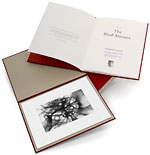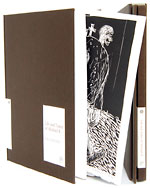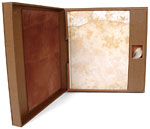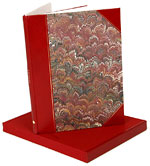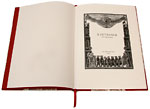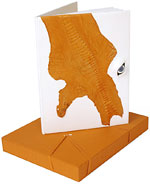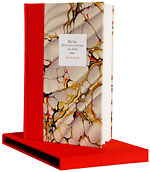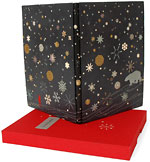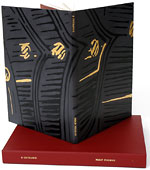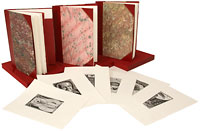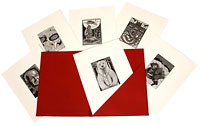Mighty Oak
A fine press is helping children with HIV/AIDS one book at a time By Jonathan Shipley
The numbers are staggering: 22.4 million people living in Sub-Saharan Africa are living with human immunodeficiency virus (HIV); nine out of ten HIV-infected children in the world live in Sub-Saharan Africa; of all the people who die from AIDS, one in seven are children. It is an ugly thing. Bruce Howard combats that ugliness with an inspired initiative—making beautiful books. Howard runs Oak Tree Fine Press outside Oxford, England. All of the proceeds from the fine limited editions he publishes help the child victims of Africa’s HIV/AIDS crisis.
“I was born and lived most of my life in Africa,” Howard said. During a professional career in insurance, he chose to become involved in social responsibility. “I was convinced of the merits of one particular organization that housed street children, some as young as four and five, living on the streets of Johannesburg.” His association with that shelter has lasted almost twenty years, and it’s still going strong. So strong, in fact, that after he and his wife had two sons, they fostered two kids from the shelter. “Both have been integral to our family life,” said Howard.
In 2000, Howard sold much of his insurance company and resolved to focus his efforts on the fifteen million children who are either infected with HIV or have lost a parent to it. About five years ago, he moved abroad and was trying to figure out how he could continue to aid the children of Africa even if he wasn’t there. That’s when John Coetzee entered the picture. Coetzee, a fellow South African, won the Man Booker Prize twice (in 1999 for Disgrace and in 1983 for Life and Times of Michael K) and the Nobel Prize for Literature in 2003. Howard and Coetzee had become acquainted during the course of Howard’s fundraising campaigns for the cause. Coetzee was signing books to be sold on behalf of shelters when he struck upon an idea. He suggested that Howard publish “extract editions”—brief limited edition books showcasing texts written by the world’s greatest living authors. “I’ve always been a great lover and collector of books,” Howard said, so Coetzee started contacting authors that might participate. When a few agreed, Oak Tree Fine Press was born.
Some of the Press’ first volumes were selections of Coetzee’s novels, Nadine Gordimer’s The Conservationist , and Barry Unsworth’s Sacred Hunger. All of the books were created with the finest materials, featuring woodcuts or photography, watercolors or etchings. Alan Hollinghurst’s The Line of Beauty was paired with the artwork of Turner Prize winners, Gilbert and George. Artist Stephen Alcorn’s work is integral to an edition of John Le Carré’s The Spy Who Came in from the Cold. Yoko Ono created artwork for Margaret Atwood’s The Blind Assassin. Of working with Ono, Howard said, “She struck me as being utterly sincere in her desire to do good.”
International artists, many of whom are members of the Designer Bookbinders Guild, support the press’ mission. They come, Howard marveled, “from around the world as far as Argentina, Mexico, Canada, the United States, the United Kingdom, Dubai, and France to offer their help.” And, they do it pro bono. “All are happy to donate their work and their time to the project,” he added.
Happy, like bestselling author Philip Pullman. Pullman lives down the road from Howard. “I was very taken with the idea at once,” said the author of His Dark Materials trilogy. “We discussed the various possibilities and settled on the passage from the first book [The Golden Compass] concerning the fight between the bears. I wrote the afterward and handed the whole thing over to Bruce.”
That “thing” became À Outrance, Oak Tree’s latest publication. Limited to 265 copies, each book features original woodcut illustrations by three of England’s foremost artists in the field (Andy English, Chris Daunt, and Harry Brockway). There are three separate editions. The Ruscombe Letterpress Art Editions are hand-bound by fifteen of the world’s finest designer bookbinders and printed by a cast iron Heidelberg Press on French Ruscombe Mill paper. There are only fifteen of those. The Somerset Letterpress Deluxe Edition numbers 50 copies, half-bound by hand in calf with marbled boards, and inscribed by Pullman with a line of text. The 200 Mohawk editions are printed offset on Mohawk paper, bound in cloth with hand-marbled boards, and signed by the author.
Some editions of À Outrance were featured recently in an exhibition at Oxford University’s Bodleian Library.
Pullman is “absolutely delighted” at the finished products. “The various editions are beautiful, and the work of the individual bookbinders is simply stunning. I could have never believed that they could have produced works of such beauty,” he said.
All of this finery may seem an unusual response to such a dire disease, but through this unique project, Oak Tree has delivered approximately $75,000 of aid to sick and struggling kids. “These children,” Howard said, “are most often illiterate and books belong to a different world from theirs which centers around basic things like food and security.”
As Howard presses on with his press, he is eager to publish more in the Nobel Lectures series he started. He published Doris Lessing’s “On Not Winning the Nobel Prize” (her acceptance speech) in a signed letterpress edition with handmade paper that was a finalist in the British Book and Production Design Awards. Günter Grass’ speech, “To Be Continued,” is forthcoming in the series, as is a signed extract of Toni Morrison’s Beloved. Howard also plans to produce A.S. Byatt’s Possession and Thomas Keneally’s Schindler’s Ark. “If we could get Alice Walker, Cormac McCarthy, Terry Pratchett, Gabriel Garcia Marquez …” Howard’s wish list is long. “I’ve played with the idea of asking someone like Bill Clinton.”
In the meantime, Howard remains enthusiastic in his goal to help children stricken with HIV/AIDS in his homeland. He said, “Every visit when we hand over the proceeds strengthens my resolve to continue.”









